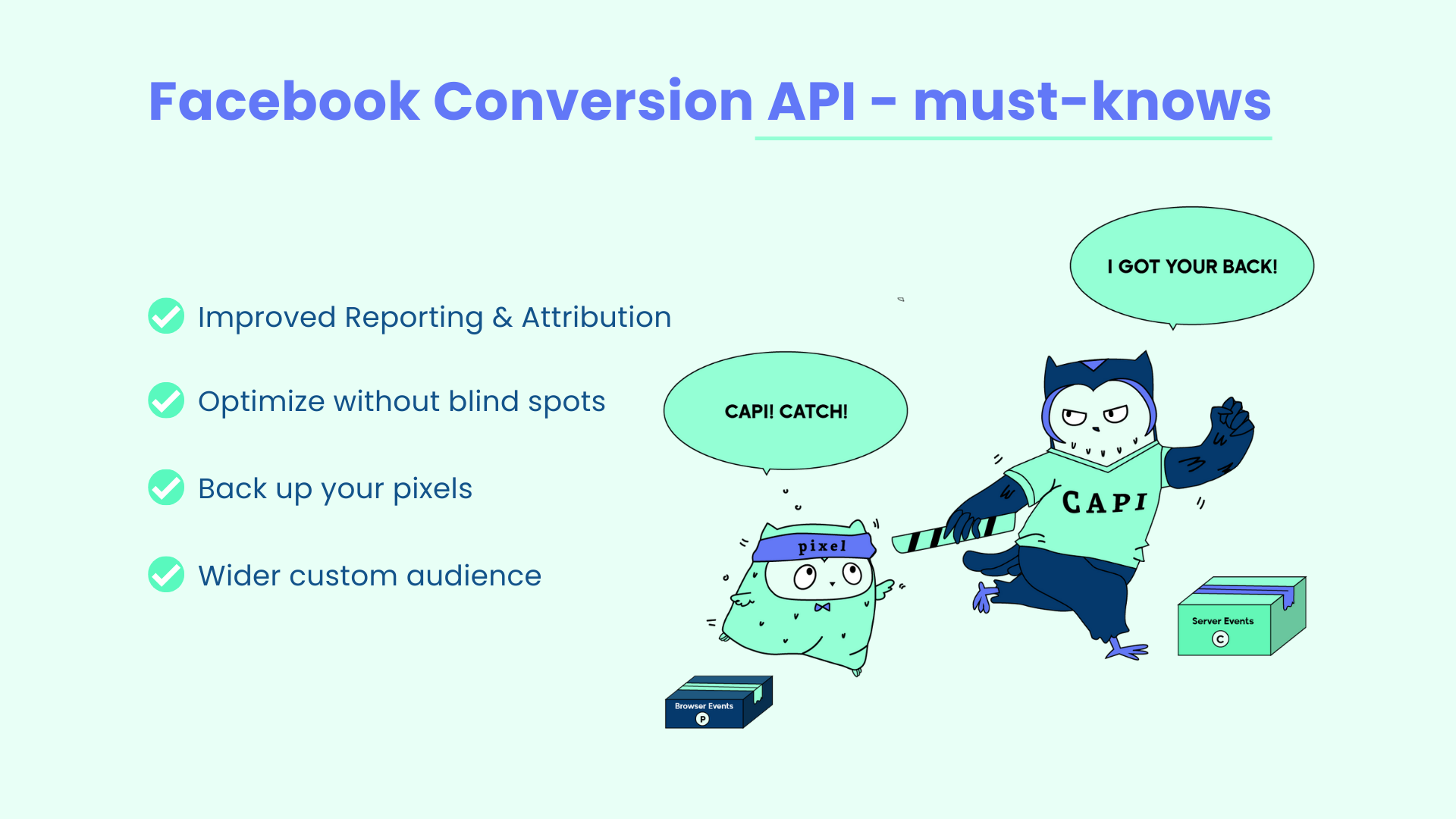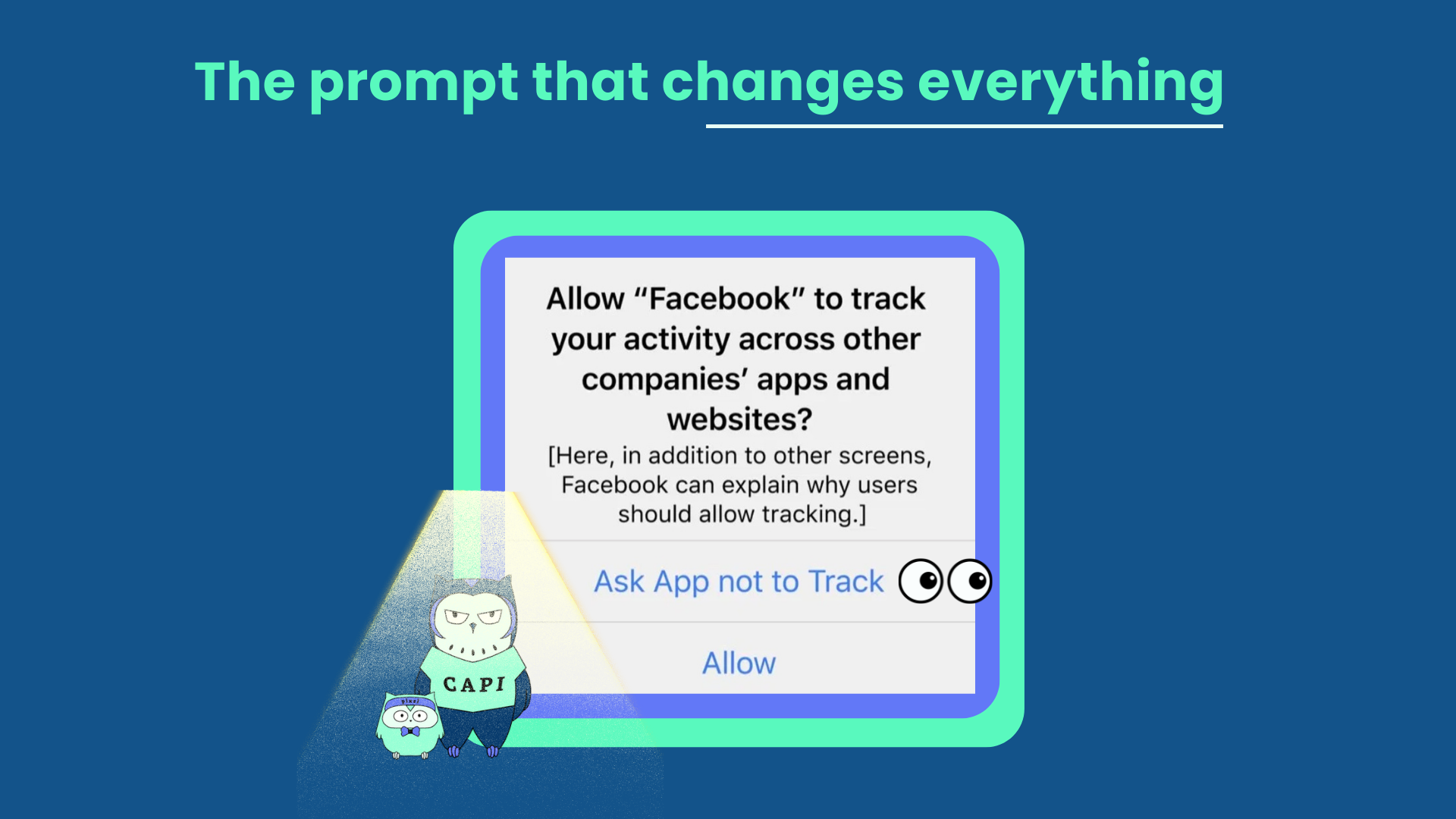Facebook Conversion API - what you must know
So you have heard about Conversion API, for like the hundredth time. They say you need it, but it's never crystal clear as to why that is so.
Is Conversion API the ultimate fix for the IOS 14 world? Does it have the ability to improve your ad performance and optimize cost? Or does it just help with better reporting?
Read on the find answers to burning questions once and for all.

So you have heard about Conversion API, for like the hundredth time. They say you need it, but it's never crystal clear as to why that is so.
Is Conversion API the ultimate fix for the IOS 14 world? Does it have the ability to improve your ad performance and optimize cost? Or does it just help with better reporting?
Read on the find answers to burning questions once and for all.
How the IOS 14 updates affect advertisers like yourself
Let's cut through the noise and focus strictly on the necessities.
With the IOS 14+ App Tracking Transparency, IOS users will be seeing a prompt that asks them to decide whether they allow Facebook to track them across sites.
It looks something like this:

And when they start to hit "ask app not to track", the trouble begins.
How?
Take a look at what will be hurt by the opted-out decision:
- Attribution/Reporting: fewer conversions will show up in your AM because the Pixel is stopped immediately for opted-out users.
Have you ever stared at your Ad Manager just to wait for three days for a conversion that never showed up? That's because the sales had never been captured and sent.
This hits advertisers whose audience are mostly IOS users the hardest since people will keep opting out! This is where Conversion API comes in (but more on this later).
- Optimization: You will optimize your campaigns based on an incomplete set of conversion data, meaning they're not so optimal as the good old days at all.
Imagine you tell Facebook to show your ads to folks who are most likely to purchase, but you can only give it just 50% of your actual sales data. It'll have to fight the battle with one eye closed!
- Targeting: Facebook won't be able to specifically retarget people who have already said no, so those won't be included in your custom audience.
Facebook has never made it clear as to whether those same people will be retargeted if they're online on another device.
But even if it does, the targeting restriction is already too bad.
Here's a survival kit:
Facebook Pixel and Conversion API combined to save your Ad Tracking
Let's just remind ourselves that the browser Facebook pixel is blocked occasionally, even before the IOS 14 update. Browser crash, ad blockers, connection, loading issues, you name it.
Technically, you can supplement this pixel loss by creating a direct connection from your server to the Facebook server to add another stream of events using Conversion API.
IOS 14 aside, here is to name just a few of the Conversion API benefits:
- Back up your pixels. Give Facebook a complete impression of your campaign performance. So Facebook won't accidentally favor one ad set over another just because of the lost data.
- Improved reporting: accurate attribution is super important when it comes to deciding which ads to pour money into. Since CAPI captures everything, despite browser issues, and despite IOS, your AM report will definitely look more promising.
- Wider custom audience: it's simple, between a set of custom audiences that lost 50% due to browser issues, you would want a complete set instead. Conversion API solves this seamlessly.
- Optimize without blind spot: Deliver your ads to more relevant people based on a full set of conversions, instead of just half of it.
So despite IOS 14 restriction, Conversion API in and of itself is inherently a more secure & smart way to share data to Facebook.
But it was not until the IOS 14 happened that more eyeballs are staring at Conversion API.
Is conversions API the ultimate fix to the IOS 14 targeting restriction?
The answer is yes and no.
- It's a yes from an aggregation standpoint. You can still have 8 prioritized events for optimization (supposed you have verified your domain and configured the events for your pixels in the Aggregated Events Measurement protocol).
If you don't have so many custom events, 8 standard events are enough. And Conversion API tracks and sends 100% of events for those standard conversions. To put it another way, you won't be affected from a learning phase perspective. Whatever the number of sales you have will be reported to Facebook so it can exist the learning phase asap.
- It's a no from a specific (re-)targeting perspective. Since Conversion API has to obey the same rules as those from the Pixels, you won't be able to retarget those folks just because they've entered your custom audience segment, no matter what.
This doesn’t mean the API isn’t important. It means that the Conversion API is even more important. While your hands are tied about who you want to target, you would want to give Facebook the maximum data sets possible to report on what it can, while it still can.
The hardship for Facebook advertisers never seems to end. Nevertheless, control what you can. Check out this best Shopify Facebook Pixel app, it'll give your Facebook ads the most complete set of data via Conversion API, and even fix Facebook's delayed attribution with a real-time, accurate report.
